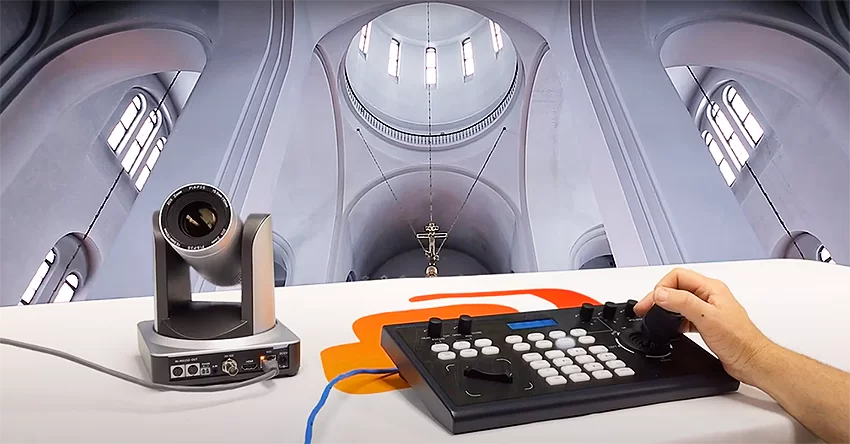Choosing Between a Joystick Controller and Software for PTZ Cameras

One of the most important aspects of a PTZ camera is how you interact with controlling it! Having smooth and efficient movements with the PTZ camera is essential if you want to have a high production value whether you’re doing a live event, a lecture or even just something that’s pre-recorded. Whether it’s a 12x PTZ camera for a classroom, a 25x PTZ camera for a church, or a 30x PTZ camera for an auditorium, the right control method can make all the difference. And that decision comes down to two options: 1) a hardware joystick controller, or 2) software to control the PTZ functions. Ultimately the decision will depend entirely on what you’d like to prioritize in your system, and what the benefits of a joystick controller or a software controller are, so let’s dive into it.
How to Connect PTZ Camera to Joystick and Control It Efficiently
Joystick controllers are great options if you want something tactile that you can put in your hands to control a PTZ camera. A joystick gives you a physical way to impart real time control with your camera. And the best part? Learning how to connect a PTZ camera to a joystick is pretty straightforward and easy!
Here's how you would go about connecting a camera to a joystick controller:
- Identify the communication protocol your PTZ camera uses: VISCA, Pelco-D/P, or IP.
- Match the output interface: RS-232, RS-422, or Ethernet.
- Connect the joystick controller to the camera using the corresponding port and cabling.
- Configure the controller to match the camera's address and protocol.
- Test movement and presets using the joystick to ensure communication is stable.
If you take the time and learn how to control a PTZ camera with a joystick your production value will skyrocket. Having a physical button or axis to control the movement or zoom of the camera is a huge boon. And that control from a joystick becomes even more important with longer focal lengths like a 25x PTZ camera or a 30x PTZ camera where precise and smooth movement is more important as you zoom in tighter to your subject.
Advantages of joystick control:
- Joysticks offer physical precision for pan, tilt, zoom
- Joysticks give fast access to presets
- Joystick controllers offer low latency
- Joystick controllers often offer compatibility with multiple models
There are also some joystick controllers that will allow simultaneous control of several cameras which would be really ideal for larger venues.
Universal PTZ Controller: Pros and Use Cases
Universal PTZ controllers serve a very important role in the joystick controller world. These controllers aren’t brand locked or model locked which means that you can use several different zoom levels or models based on your specific needs or if you just simply don’t want to be locked into a specific ecosystem.
Use cases for a universal PTZ controller include:
- Houses of worship managing both wide and zoomed-in views
- Broadcast studios running multi-brand PTZ cameras
- Conference halls with legacy and new equipment
Compared to a basic joystick controller, a universal model supports:
- Multiple IP streams
- Custom preset configurations
- Multi-brand protocol compatibility
As mentioned earlier, the flexibility of a universal PTZ controller is great. Especially if you need to consider a different brand or model of camera because you’re looking for a non standard focal length like a 12x PTZ camera while also utilizing the 20x PTZ cameras from another brand.
Software to Control PTZ: When Virtual Beats Physical
One downside though of physicalized controllers is that they’re often not a small investment to make, especially when you’re already spending hundreds if not thousands of dollars on PTZ cameras. This is where software to control PTZ cameras comes in. Often this means you can remotely control cameras as long as you’re on the same network and more often than not, PTZ brands will include control tools with their devices.
Top options for software to control PTZ:
- Browser-based WebUI for direct IP control
- OBS plugins for open-source environments
- vMix for complex switching and automation
- Brand-specific desktop or mobile apps
Some advantages that software gives you:
- Centralized remote operation
- Automation via scripts or hotkeys
- Flexible access from any networked device
Depending on your environment, you might find a software controller to be the ideal way to control your production instead of a hardware based solution. Anywhere where constant hands on control wouldn’t be needed like a lecture hall would likely be a great candidate for these software based solutions. They can even make things like automated movements or switching between say a 12x PTZ and a 30x PTZ as easy as one tap on your phone.
Conclusion: Choosing the Best Way to Control Your PTZ Camera
So if you’re still asking yourself, “What’s the best way to control my PTZ camera?”, we’ll solve that for you right now! If you want the maximum amount of control and precision then a joystick controller is going to be your best bet (don’t forget to look into a universal PTZ joystick controller if you want something that will work with most everything). If budget or automation through camera presets are more of a concern then we’d recommend sticking with software to control your PTZ cameras. Also make sure to consider the amount of cameras you want to use and how you want to use them. Making sure you pick the right control interface, whether it’s a joystick or a software solution, for your production regardless of if it’s a 20x PTZ in a studio or a 25x PTZ in a church can make a huge difference in your outcomes!
8.00 a.m. - 5.00 p.m. (PST)
10.00 a.m. - 3.00 p.m. (PST)
(by appointment only)




